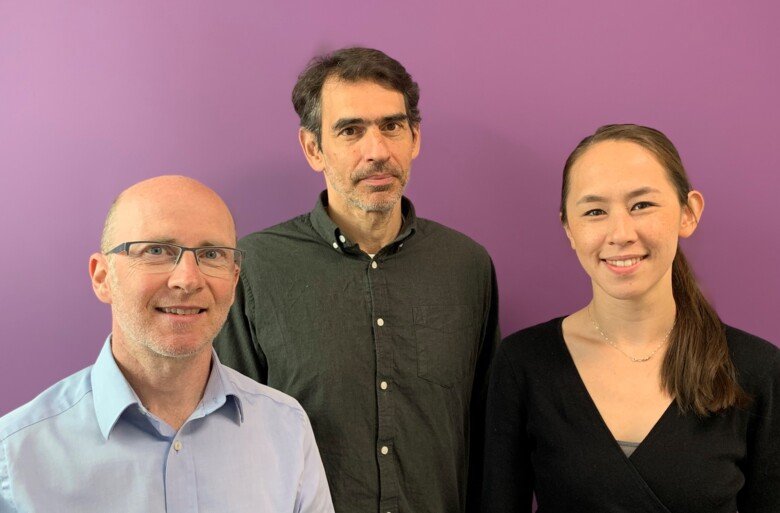A novel autophagy inhibitor from Sprint Bioscience developed in collaboration with OnkPat improves the efficacy of immunotherapy in preclinical tumor models

The combination with a novel autophagy inhibitor blocking the lipid kinase Vps34 sensitizes tumors to immune-checkpoint inhibitors (ICI) in preclinical mouse models. These data have been published in Science Advances and are the results of a collaboration between the Department of Oncology-Pathology, the Swedish drug discovery company Sprint Bioscience and Dr. Bassam Janji at the Luxemburg Institute of Health. This is the first demonstration that pharmacological inhibition of autophagy through blocking Vps34 can be an important tool for improving immunotherapy in cancer patients.
Autophagy is a process for breaking down and recycling cellular components. It is already known that tumor cells use autophagy to gain access to nutrition and cope with different types of metabolic stress. The newly published data show that activated autophagy also helps tumor cells to escape the immune system. Sprint Bioscience lead compound SB02024 blocks autophagy in tumor cells by inhibiting the protein Vps34. When autophagy is blocked, tumor cells become more easily recognized by the immune system.
The results reported in the publication show that inhibition of Vps34 increased the infiltration of immune cells into melanoma and colorectal tumors, resulting in reduced tumor growth and increase mice survival. The compound SB02024 increased the number of cytotoxic immune cells such as NK cells and T cells in the tumor, indicating the ability of this drug candidate to activate the body’s own defense against cancer. The role of Vps34 inhibition as a driver in such a pro-inflammatory process has been demonstrated by genetic knockdown and confirmed using another selective Vps34 inhibitor compound (SAR405).
At the same time, our studies showed that SB02024 can significantly improve the therapeutic efficacy of the ICI anti-PD-1 or anti-PD-L1 in melanoma and colorectal cancer mouse models. These check point inhibitor drugs are currently used for several cancer indications but have proven to be effective in only about 20-30% of the patients.
“Although some studies suggest that defective autophagy is associated with a proinflammatory response regulating innate immunity, this is the first study showing that hampering autophagy with Vps34 kinase inhibitors increases the efficacy of anti-PD-1/PD-L1 immunotherapy by modulation of the tumor inflammatory status”, says Angelo De Milito, Director of the Tumor Biology team at Sprint Bioscience and affiliated with the Department of Oncology-Pathology. “A limitation of immunotherapies based on the use of immune-checkpoint inhibitors is that only a small fraction of patients benefits from such treatments. Poor therapeutic efficacy is often associated with the lack of cytotoxic immune cells in the tumor tissue at the start of treatment. Therefore, we believe that by inducing a proinflammatory status leading to the recruitment of CD8+ T cells and NK cells in the tumor, treatment with SB02024 creates the optimal conditions to increase the efficacy of ICI. This therapeutic strategy may translate into increasing the number of patients that may benefit from immunotherapy.”
Yasmin Yu, a PhD student at OnkPat supported by an Industrial PhD grant from the Swedish Foundation for Strategic Research (SSF), and Santiago Parpal, project leader for the Vps34 program at Sprint Bioscience, also affiliated with OnkPat, are coauthors of the study. “Within the frame of my doctoral research project, and supervised by Katja Pokrovskaja at KI and Angelo De Milito at Sprint Bioscience, I am now investigating the molecular mechanisms modulating the pro-inflammatory effects of Vps34 inhibitors”, says Yasmin Yu.
Publication
Inhibition of Vps34 reprograms cold into hot inflamed tumors and improves anti–PD-1/PD-L1 immunotherapy.
Muhammad Zaeem Noman, Santiago Parpal, Kris Van Moer, Malina Xiao, Yasmin Yu, Jenny Viklund, Angelo De Milito, Meriem Hasmim, Martin Andersson, Ravi K. Amaravadi, Jessica Martinsson, Guy Berchem, Bassam Janji.
Science Advances 29 Apr 2020: Vol 6, no 18, eaax7881. DOI: 10.1126/sciadv.aax7881
